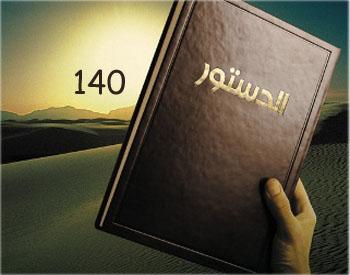 Last week, the committee tasked by the Supreme Council of the Armed Forces (SCAF) with amending several articles of the Constitution completed its mission. The committee chairman Counsellor Tareq al-Bishri announced the amendments introduced to drive political reform in Egypt. These cover conditions to contend for the presidency, and propose a maximum of two terms in office as well as full judicial supervision of polls. The President is committed to appoint a vice president—or more than one—in a maximum of two months following his accession to power. In my view, all the amendments are reassuring as they meet the public's aspirations for change—before and after the 25 January revolution.
Last week, the committee tasked by the Supreme Council of the Armed Forces (SCAF) with amending several articles of the Constitution completed its mission. The committee chairman Counsellor Tareq al-Bishri announced the amendments introduced to drive political reform in Egypt. These cover conditions to contend for the presidency, and propose a maximum of two terms in office as well as full judicial supervision of polls. The President is committed to appoint a vice president—or more than one—in a maximum of two months following his accession to power. In my view, all the amendments are reassuring as they meet the public's aspirations for change—before and after the 25 January revolution.
For a slate system
Youseef Sidhom
Opinion
00:03
Sunday ,06 March 2011

In the same context, the amendments restrict the power of the President, especially in relation to declaring a state of emergency. Egyptians see the emergency law as a nightmare. For decades, calls and efforts to abrogate the law have been to no avail as the parliament—dominated by the then ruling National Democratic Party (NDP)—was reluctant to touch the law. Now Parliament’s approval is a must before invoking a state of emergency, the validity period of which should not exceed six months. For the state of emergency to be extended, the public should approve it in a referendum.
The amendments went further to propose the formation of a 100-member constituent assembly to draft a new constitution, again approved via a public referendum.
The articles covered by the amendments are 75, 76, 77, 88, 93, 139, 148 and 189. As for article 179, which allows the president to refer civilians to military tribunals, it was annulled. Yet the committee’s work did not touch upon the constitutional articles which deal with the foundation of political parties or with the elections of the People’s Assembly and Shura Council (the lower and upper houses of Egypt’s Parliament). In the eyes of the revolutionary masses, however, these demands are no less important than those concerning the prerogatives of the President. Now that the SCAF has dissolved both houses of parliament, the rules regulating their reformation have to be set as soon as possible to put an end to the ambiguity characterising this question.
After disclosing the proposed amendments, al-Bishri announced that from now on voters will need no more than their ID cards to cast their ballots. This marks a welcome farewell to the infamous voting cards with all the problems they cause.
Other things need further clarification, however.
A host of pundits and observers asked whether the upcoming elections will be held in accordance with the existing system or they will be postponed until the free formation of political parties is allowed; this would surely give an opportunity to inject new blood into political life. With the demise of the ruling NDP—which might possibly disappear altogether—and the disarray most parties are now suffering from, competition will be inconceivable without the introduction of new political parties. Otherwise, the parliament would consist mainly of independents. In this case, problems will arise when trying to give an account of the majority and minority—the government and opposition.
In addition to this thorny issue, the committee has not said a word about changing the current individual candidacy to a slate system. I cannot understand how the committee overlooked such a matter—which I consider the most important in this regard. On the ground, the individual candidacy system prevents free competition in favour of family loyalties and the power of money. It turns voters to mere tools ready to be misused by corrupt candidates.
If we are to bring about genuine political reform, and if we are to listen attentively to the voices raised after and before 25 January, the present individual candidacy should give way to a slate system. This way, free competition based upon parties’ platforms would govern our political life, and corruption would vanish. Around the world, there is variety of systems that could be examined to choose a formula which suits us best—these include the combination of the slate and individual candidacy. I hope this issue would cease to be placed on hold in the coming period. Otherwise, elections will in all likelihood produce an incompetent, self-interested and corrupt parliament similar to those we used to have in the past.



